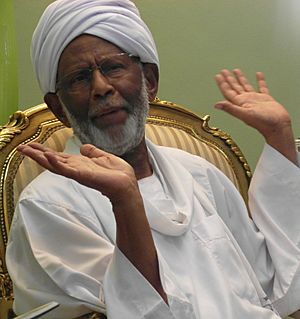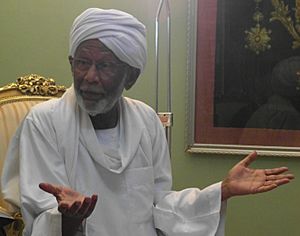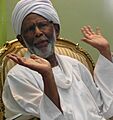Hassan Al-Turabi facts for kids
Quick facts for kids
Hassan Al-Turabi
|
|
|---|---|
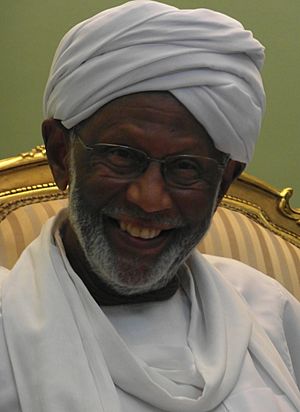
Al-Turabi in 2015
|
|
| Secretary General of the Popular Congress Party | |
| In office 1999–2016 |
|
| Preceded by | Position established |
| Succeeded by | Ibrahim El Sanousi |
| Speaker of the National Assembly | |
| In office 1996–1999 |
|
| President | Omar al-Bashir |
| Preceded by | Muhammad Al-Amin Khalifa |
| Succeeded by | Ahmed Ibrahim Al-Tahir |
| Foreign Minister of Sudan | |
| In office 1989–1989 |
|
| President | Omar al-Bashir |
| Preceded by | Hussein Suleiman Abu Saleh |
| Succeeded by | Sid Ahmad al-Hussein |
| Attorney General of Sudan | |
| In office 1978–1982 |
|
| President | Gaafar Nimeiry |
| Secretary General of the National Islamic Front | |
| In office October 1964 – 1999 |
|
| Personal details | |
| Born | 1 February 1932 Kassala, Anglo-Egyptian Sudan |
| Died | 5 March 2016 (aged 84) Khartoum, Sudan |
| Political party | PCP |
| Other political affiliations |
|
| Parent |
|
| Alma mater |
|
Hassan 'Abd Allah al Turabi (born February 1, 1932 – died March 5, 2016) was an important political figure from Sudan. He was known for his strong beliefs about Islam and politics. Many people saw him as the main person behind a big change in Sudan's government in 1989. This change brought Omar al-Bashir to power.
Al-Turabi was a very influential person in Sudanese politics for a long time. He played a key role in making Islamic law, called sharia, a part of the laws in northern Sudan. He was put in prison many times in Sudan. However, he also held high government jobs during different periods.
He led a political group called the National Islamic Front (NIF). This group later changed its name to the National Congress. The NIF became very powerful in Sudan, even though it wasn't always popular with voters. They tried to bring their ideas into the government by having their members in important positions. Al-Turabi and the NIF were most powerful from 1989 until 2001.
Contents
Early Life and Education
Hassan al-Turabi was born in Kassala, eastern Sudan, on February 1, 1932. His father was a religious leader. Hassan received an Islamic education from a young age.
In 1951, he moved to Khartoum to study law at University of Khartoum. While there, he joined the Muslim Brotherhood, a religious and political group. He finished his law degree in 1955. He also studied in London and Paris, where he earned a PhD in 1962. In the early 1960s, he became a leader of the Sudanese Muslim Brotherhood.
His Ideas and Beliefs
Al-Turabi's ideas about religion and politics were often seen as modern and open-minded. However, his time in power was also linked to concerns about human rights. Some people believe he presented different views depending on who he was talking to.
He believed in sharia (Islamic law) and an Islamic state. But his ideas were different from some other strict Islamic groups. He thought that all kinds of knowledge, like science or law, could be seen as religious. He also had some progressive views on women's roles. He believed women should work and be part of public life.
Al-Turabi also discussed the meaning of hijab. He said it meant a "barrier" or "curtain" used to separate people, not necessarily a face veil. He also disagreed with the death penalty for leaving Islam. He wanted Islamic law to be applied slowly and only to Muslims. He also thought Muslims and Christians could share power in a federal system.
Later in his life, when he was not in power, al-Turabi made headlines by saying Muslim women could marry non-Muslim men. He also spoke more about human rights and democracy.
Political Journey
Early in his career, al-Turabi led the Sudanese Muslim Brotherhood. In 1964, he became the leader of the Islamic Charter Front (ICF), which was the political part of the Muslim Brotherhood. He was elected to parliament in the mid-1960s.
After a military coup in 1969, he was put in prison for seven years. He was released in 1977. He then became the Attorney General in 1979 and later an advisor on foreign affairs in 1983. He was imprisoned again in 1985 but released later that year. In 1985, he started the National Islamic Front (NIF). He held several government jobs in the late 1980s.
National Islamic Front in Power
On June 30, 1989, a coup d'état (a sudden takeover of government by force) happened in Sudan. General Omar Hassan al-Bashir led this coup. After the coup, political parties and independent newspapers were banned. Many political leaders were arrested.
From 1989 to 2001, al-Turabi was seen as the main thinker behind the government. He was sometimes the official leader of the NIF and sometimes the speaker of the parliament.
The 1989 Coup
Many people in Sudan believed that al-Turabi and the NIF worked closely with the coup leaders. However, the new government banned all political parties, including the NIF. Al-Turabi himself was arrested and held alone for several months. But soon, the NIF's influence became clear in the government's actions and because many NIF members were in the cabinet.
Human Rights Concerns
During the time the NIF was in power, there were concerns about human rights. Reports mentioned that people were treated unfairly, and there were problems with freedom of speech and assembly.
Attack in Canada
In 1992, a Sudanese man attacked al-Turabi at an airport in Canada. The attacker was a martial arts expert and an opponent of the NIF government. Al-Turabi was hospitalized for several weeks after the attack.
Connections to Other Groups
The leader of Al-Qaeda, Osama bin Laden, moved to Sudan around 1991. It is said that al-Turabi invited him. Bin Laden stayed in Sudan until 1996. He moved there after disagreeing with the Saudi government about allowing US troops in Saudi Arabia during the Gulf War. Al-Turabi reportedly offered bin Laden a safe place. In return, bin Laden helped the Sudanese government with projects like road building.
Al-Turabi also founded the Popular Arab and Islamic Congress in the early 1990s. This group brought together various Islamic organizations from around the world.
In 1993, the United States listed Sudan as a country that supported terrorism. This was after a bombing in New York City, and some suspects were Sudanese. In 1995, there was an attempt to assassinate the Egyptian President Hosni Mubarak. Members of an Egyptian group living in Sudan were involved.
Later Years and Imprisonment
After 1996, al-Turabi's influence began to decrease. This was partly because the United Nations put sanctions on Sudan. Sudan also started to try and improve its relationships with other countries.
In 1996, al-Turabi was elected to the National Assembly and served as its speaker.
After a disagreement with President Omar al-Bashir in 1999, al-Turabi was imprisoned. He was released in 2003. He was arrested again in 2004 for allegedly planning to overthrow the government, but he was released in 2005.
In 2004, he was thought to be connected to the Justice and Equality Movement (JEM), a rebel group involved in the Darfur conflict. Al-Turabi denied these connections. He spent 16 months in prison from 2004 to 2005.
He was arrested again in 2008 after the JEM attacked Khartoum. He was questioned and released the same day. He later described the JEM's attack as "positive" because of the problems in Darfur.
In 2009, al-Turabi called for President Bashir to face the International Criminal Court for actions in Darfur. He was arrested again in January 2009 and held for two months. His family and human rights groups were concerned about his health due to his age.
In 2010, al-Turabi was arrested again but released later that year. In 2011, he was arrested after speaking about rising prices in Sudan. He warned that this could lead to a "popular uprising," similar to events in other Arab countries.
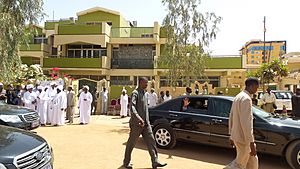
Death
Hassan al-Turabi passed away on March 5, 2016, in a hospital in Khartoum. He was 84 years old and was believed to have died from a heart attack. His funeral was held the next day, with many people attending. He was buried in a cemetery in eastern Khartoum.
Images for kids
See also
 In Spanish: Hasan al-Turabi para niños
In Spanish: Hasan al-Turabi para niños
 | Aurelia Browder |
 | Nannie Helen Burroughs |
 | Michelle Alexander |


